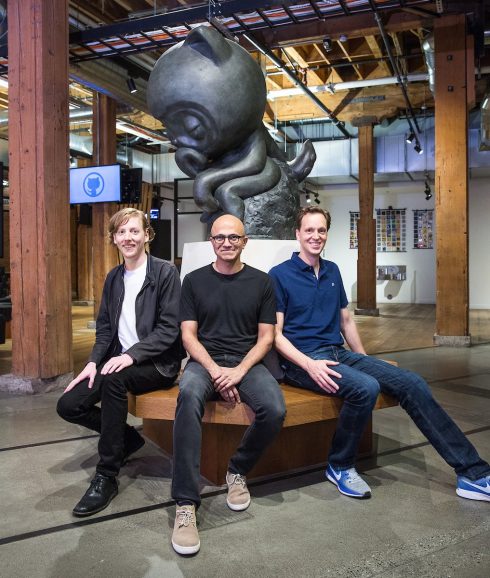
Yesterday, after days of speculation, it was confirmed that Microsoft would acquire GitHub for $7.5 billion.
According to Microsoft’s CEO Satya Nadella, with developers on the forefront of this new digital era, the company wanted to ensure it could help them learn, share and work together to build software solutions. “Developers are the builders of this new era, writing the world’s code. And GitHub is their home,” he wrote in a post.
Nadella cited three opportunities for the two companies going forward: 1. To empower developers, 2. To accelerate the enterprise use of GitHub and 3. To bring Microsoft developer tools and services to new audiences.
Since the news was announced, a number of thought leaders have put their two cents in about the acquisition. Overall, it seems the majority of the industry agrees that this is a natural fit for the two companies.
Here is what some thought leaders had to say:
Sid Sijbranij, CEO of GitLab:
“The way developers produce, deliver and maintain code has changed significantly in the last ten years and we applaud GitHub for being a driving force supporting the vast independent developer community through this evolution. This acquisition affirms the global importance of software developers and their influence in the enterprise. Microsoft likely acquired GitHub so it could more closely integrate it with Microsoft Visual Studio Team Services (VSTS) and ultimately help drive compute usage for Azure.”
Mik Kesten, CEO of Tasktop:
“Microsoft has long known how to value the hearts and minds of developers. Though it’s under Nadella that they seem to be getting the value of OSS. Not a bad price tag given this gets them a good chunk of the world’s software!”
Sacha Labourey, CEO of CloudBees
The net of the news is that this acquisition confirms the strategic value of DevOps. As software is eating the world, developers have become the new kings. DevOps vendors that have been able to show great developer adoption as well as build associated revenues are incredibly strategic.
The immediate question is whether Microsoft is a good destination for GitHub? The answer is easy: I can’t think of a better destination for GitHub than “The New Microsoft.” The New Microsoft totally gets developers. GitHub has built an amazing social network for developers who are likely not going to be in a hurry to leave this buzzing hive anytime soon for some temporary FUD. Furthermore, I predict Microsoft will be further investing to pursue GitHub’s mission, including adding what has been lacking the most to GitHub in the last year: a leader at their top.
Jim Rose, CEO for CircleCI:
MSFT’s origins are as productivity tools — Windows, Word, PPT. Every company is now a software company. Engineering productivity is a primary driver of every business. MSFT wants to make bigger moves into the cloud and ultimately to compete with Amazon. This gives them a strategic advantage against Amazon because it puts them upstream in a developer’s workflow before they think of infrastructure or needing to deploy. We should expect to see it get really easy to deploy to Azure, and for the awareness of MSFT’s cloud offering to increase via the GitHub platform. The Microsoft of many years ago built Windows with the developer ecosystem in partnership. In many ways this is bringing them back to those roots.
Brian Fox, CTO of Sonatype:
Microsoft’s acquisition of GitHub shows that the developer is king, collaboration is critical to innovation, and open source has truly taken center stage.
While Microsoft initially viewed open source programs with skepticism, fearing competition with its proprietary model, it has quickly realized that open source, and its developers, are what’s driving today’s application economy. Developers build the infrastructure that underpins our lives and businesses; collaboration between them is crucial to unlock open source’s full potential.
Any and every initiative that helps to build better software faster, should always be supported. With Microsoft’s resources behind a great company like GitHub, the future of secure, quality open source looks brighter than ever.
Mark Sami, vice president of Microsoft and cloud solutions at the digital tech consultancy SPR:
I personally think this is a great move for both Microsoft and GitHub. Microsoft has really shown its support for the open source community, and this is another huge step in arming all developers in using the latest and greatest development tools to develop on Microsoft’s platform. This also helps GitHub, as they’ve been leaderless for a while as a company. The Microsoft acquisition gives the company direction and could allow for an even larger user base as additional VSTS customers begin to adopt GitHub.
Nicole Bryan, VP of product management for Tasktop:
Microsoft’s acquisition of GitHub is another validation of the undeniable importance of DevOps in the digital age. As companies realize more and more that software is at the core of everything they do, they need strategies to connect all aspects of how software is built. This includes the actual code, which GitHub specializes in, to features, tests and support tickets, which Microsoft specializes in. This is just the beginning of a long road of seeing more and more recognition of the specialized tools required to build innovative software – and validation that connecting them all is core to any digital transformation.
Setu Kulkarni, vice president of product & corporate strategy for WhiteHat Security:
Microsoft’s purchase of GitHub is a visionary acquisition that can further extend their cloud-native design-develop-run ecosystem play. With GitHub and subsequent integrations with the breadth of the Microsoft stack, Microsoft hopes to gain wider adoption across the developer community and enterprises alike.
Development teams are tasked more than ever to keep content secure as the market adjusts to continuous shifts. We at WhiteHat Security agree that security and secure development are a priority for all types of businesses, and we anticipate additional opportunities for even more collaboration and innovation in the future.
Udi Nachmany, VP of sales and business development for Cloud 66:
The news of Microsoft acquiring GitHub is strong market validation that the best tools for developers are the ones built by developers. GitHub managed to add significant value on top of open source, which seems to be an emerging and winning model that we also follow. Microsoft will now own large parts of the software delivery chain: GitHub (source control), Visual Studio (IDE), Azure and Azure Stack (compute), package management (Helm), and more. Given Microsoft’s increased activity around Kubernetes, CI and container delivery seem to be gaps in that story—this is a great opportunity for providers of complementary tools, such as Cloud 66’s Container Delivery Pipeline, to offer unique value to customers within this context.
Sam Basu, a member of the developer relations team for Progress:
This was destined to happen. Microsoft is by far the biggest contributor to GitHub and cares too much about its OSS investments after the death of CodePlex.
Randy Bias, VP of technology and strategy at Juniper Networks:
It’s a great deal. Microsoft has long valued and enabled developers. As it transitions to a true cloud player it is also learning to embrace open source and Linux. GitHub is a natural extension of what Microsoft has always been about. This deal proves we are deeply into the cloud era and that businesses must embrace and transform themselves or face the consequences.
In addition, Atlassian and GitLab both revealed that since the news went live, they have seen a uptake in teams switching over to their solutions.
Atlassian stated in a post that “After the announcement of Microsoft’s acquisition of GitHub, Bitbucket started to see a spike in the number of GitHub users migrating their repositories to Bitbucket. Why? Many users understand they can get everything they had on GitHub in Bitbucket plus more, and at a lower cost. Tens of thousands of customers – including 60 of Fortune 100 – turn to Bitbucket as their code collaboration solution.”
According to GitLab: It has been a crazy 24 hours for GitLab. More than 2,000 people tweeted about #movingtogitlab. We imported over 100,000 repositories, and we’ve seen a 7x increase in orders.






